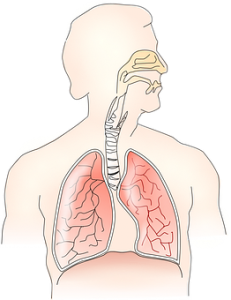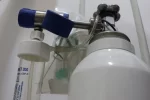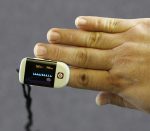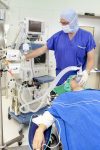
It is well known that an associate’s degree in respiratory therapy is enough to start working as a professional in this field, but being that this healthcare field continues to grow and develops, the demand for professionals with advanced educational levels and specialized skills is increasing as well.
The more advanced skills make these professionals able to diagnose and treat unique patient issues and disorders.
You can choose to reach a concentration in cardiovascular and pulmonary disorders.
Once you become a trained medical professional, you can become a clinical practitioner and care supervisor, which will lead to an increasing in your earning potential.
The great news is that The U.S. Bureau of Labor Statistics (BLS) projects a 23% increase in demand for respiratory therapists, making new job openings for these professionals.
Page Navigation
- Should I Get a Bachelor’s in Respiratory Therapy?
- What Can I Do With a Bachelor’s in Respiratory Therapy?
- How to Choose a Bachelor’s in Respiratory Therapy Program
- Programmatic Accreditation for Bachelor’s Programs in Respiratory Therapy
- Bachelor’s in Respiratory Therapy Program Admission Requirements
- What Else Can I Expect From a Bachelor’s in Respiratory Therapy Program?
- How Long Does It Take to Get a Bachelor’s in Respiratory Therapy?
- How Much Is a Bachelor’s in Respiratory Therapy?
- Resources for Respiratory Therapy Students
- Professional Organizations in Respiratory Therapy
Should I Get a Bachelor’s in Respiratory Therapy?
Respiratory therapists are people who work with patients with respiratory problems, like emphysema and asthma, and besides having knowledge related to medicine, they need to know how to use different types of respiratory equipment.
All these can be taught if you attend a respiratory therapy program, as its main focus will be on healthcare research, disease management, and respiratory health patient education.
During these studies, students will develop the skills to work in emergency and critical care environments, and the higher degree they reach, the better job prospects and higher salaries they can expect.
Many people choose to reach a bachelor’s degree in respiratory therapy and they usually already have an associate degree and prior work experience.
Being that these people are already familiar with the basics of respiratory care, they can attend an online bachelor’s program.
However, those without any previous medical knowledge should choose to attend on-campus programs.
When selecting the format you will attend, you need to choose the one that will suit your personal learning style and best fit your schedule.
What Can I Do With a Bachelor’s in Respiratory Therapy?
The first step is to become a graduate, and then you will become skilled enough to work in many different professional facilities.
It is up to you to explore other areas of therapy, like occupational or physical therapy, depending on your interests.
Or, you can choose to move up and work as medical managers at healthcare facilities.
Students who are fond of anatomy and medical equipment sometimes pursue cardiovascular technologist positions.
How to Choose a Bachelor’s in Respiratory Therapy Program
As we have already mentioned, great and detailed research of facilities that offer a bachelor’s degree is a must before applying.
Applicants must pay special attention to the program cost, program length, curriculum, delivery format, accreditation, enrollment status, and specialization options so as to find the right program for themselves.
They need to have in mind that program costs vary by school, and cheaper education is always offered at public institutions than in private schools.
Program length also varies, as there are schools that offer degree advancement programs, which transition students with associate degrees into bachelor’s programs.
As they require fewer courses to be finished, it takes less time to complete.
If you are a full-time student, you will need four years to obtain a bachelor’s degree in respiratory therapy.
Curriculum and the number of courses students must take also vary from school to school.
You can either choose on-campus courses if you have a lot of free time to devote to your education or online programs which are designed for working professionals who need to combine education and preserve their jobs.
Programmatic Accreditation for Bachelor’s Programs in Respiratory Therapy
When choosing the ideal school for you, it is of the greatest importance to pay attention to whether or not its programs are accredited.
Schools apply for regional or national accreditation but not all of them get it.
Regional accreditation is the most prestigious designation, and students can easily transfer credits to other institutions.
After receiving regional or national accreditation, there are schools that apply for programmatic accreditation.
The programmatic accreditation process is related to an individual program and a group of academics and experienced industry professionals has a duty to interview course instructors and review the program’s course list so as to determine whether they meet the criteria known as accreditation standards.
Programmatic accrediting bodies will give accreditation only to those programs that adequately prepare graduates to go into the workforce.
The Commission on Accreditation for Respiratory Care (CoARC) determines programmatic accreditation for the respiratory therapy degree and so as to be eligible to sit for a National Board for Respiratory Care credential exam, students must attend a CoARC program.
Bachelor’s in Respiratory Therapy Program Admission Requirements
We consider it worth mentioning that aspiring respiratory therapists need to find out the enrollment requirements for the specific educational institution being that the respiratory therapy degree admissions process varies greatly among them.
They typically select applicants based on academic criteria, meaning that their academic record, test scores, and extracurricular activities are all included.
Student’s academic performance is determined according to their high school and college transcripts which have to be provided.
The staff usually examines students’ course history and final grades and SAT or ACT test scores.
Admissions calendars also vary by school, so early action applicants submit their portfolio by early November.
On the other hand, rolling admissions candidates have time until summer to submit their information.
If you are sure that you meet their eligibility requirements, you can provide all the documents required for the submission process, you will increase your chances of admission when applying.
When prerequisites for enrollment into respiratory therapy programs are in question, aspiring students must have a GPA of 3.0 or higher, but there were cases that students with a lower GPA were accepted if they excel in other areas.
For transfer students, the GPA requirements are a 3.0.
You will need to provide certain admission materials when applying and those include the following:
- Application: You can either apply via the standard application and you are supposed to fill out standard information about yourself. There are also some schools that use The Common Application, meaning that students use it to apply to multiple schools at the same time.
- Transcripts: You will need to provide your transcripts so as to give your future school an overview of your academic history, being that transcripts include your course load, GPA, and graduation date.
- Letters of Recommendation: Letters of recommendation are typically requested if the school staff wants to learn more about a student’s character and they are usually written by former teachers, supervisors, coaches, and mentors.
- Test Scores: If a school requires your test scores, its staff wants to see high SAT or ACT scores in the math and science sections.
- Application Fee: you will need to pay a fee so that your application is processed and fees range from $30 to $100. Payments are submitted with the applications.
What Else Can I Expect From a Bachelor’s in Respiratory Therapy Program?
Those who belong to potential students are suggested to do detailed research for a respiratory therapy degree and get familiar with a typical respiratory therapy curriculum as course details vary by school.
The school staff determines how courses will be weighed, but the tenets of respiratory care are the same.
How Long Does It Take to Get a Bachelor’s in Respiratory Therapy?
This also depends on the school you attend and the level of education you want to reach.
There are two different options for respiratory therapy degrees: a degree advancement program and a traditional program.
If you have chosen to attend a degree advancement program, you should know that it is ideal for students with an associate degree or previous college credits which can be transferred into an accelerated program.
You will finish this program in two years’ time or less and its curriculum is mainly focused on the supervisory aspects of clinical respiratory care.
It is usually chosen by people who want to work in management roles.
The second option is the traditional track whose curriculum prepares students without previous respiratory care experience to join the industry.
All in all, if you belong to those students who want to spend less time in school, you should choose an accelerated program but first, you need to make sure that all your credits are transferable.
In degree advancement programs, students need 30 or more credits, while traditional programs require 120 or more.
How Much Is a Bachelor’s in Respiratory Therapy?
Just like any other educational costs, the cost of a bachelor’s degree in respiratory therapy will depend on the school you choose to attend.
Some schools have determined a flat rate per semester, a flat rate for credit range, or cost-per-credit or course and these are different ways of paying the tuition.
If a school uses a flat rate per semester system, students are supposed to pay a singular price for the entire term.
A flat rate per-credit range means that students must pay a set tuition price based on the number of credits they take each term.
The last kind of payment is the cost-per-credit systems and it allows students to pay per course and this is typically applied to part-time and online students.
Cost-per-credit systems are cheaper than other kinds of payment, due to the fact that students take fewer courses during the semester.
Other reasons for cheaper tuition costs for part-time and online students is that they tend to live off-campus and occasionally commute to school.
Also, you need to have in mind that universities charge a variety of fees.
These are all added to the tuition bill and will increase the overall cost of the program.
Approximately, respiratory therapy degrees cost between $11,000 and $30,000 per semester.
Resources for Respiratory Therapy Students
- Respiratory Therapy Flashcards – This site is specially designed for students who can study for their exams using flashcards created by their peers. They can use cards to test their respiratory care knowledge necessary for the successful passing of the examination.
- YourLungHealth.org – This is a patient-focused site and it is specially designed for people with lung diseases, asthma, and allergies. You can find articles about respiratory care medication and care providers in your area.
- Respiratory Care Journal – This journal is distributed by the American Association for Respiratory Care and it offers texts about cardiorespiratory disorders, and pathophysiology, there you can find original research and peer-reviewed articles.
- The National Board for Respiratory Care – This is the authority for respiratory care credentials and education which has to offer nine credentials and provide comprehensive information regarding test preparation.
Professional Organizations in Respiratory Therapy
Professional organizations can be very useful for individuals in their industry as they are made to connect people with the same aspirations and ideas, with the aim to build lifelong friendships among them, thus exchanging ideas and thoughts.
Each professional association makes students able to work with legislators, educators, and professionals, and joining an organization will allow them to attend annual conferences and networking events.
- American Association for Respiratory Care – The first one on our list is the AARC – a professional organization whose main aim is to advance the practice of respiratory science, so it focuses primarily on specialty educational programs made exclusively for respiratory therapists.
- American Lung Association -This association has a mission to educate respiratory care professionals and the general public about topics related to lung health. It provides people with researches on lung cancer, it advocates for cleaner air, and emphasizes the dangers of tobacco smoking.
- American Association of Sleep Technologists – This association started in Minnesota in 1978 and they boast to be the pioneers in sleep medicine. They are focused on new developments, such as ambulatory sleep medicine and telemedicine.
- American Association of Cardiovascular and Pulmonary Rehabilitation – This is a place in which therapists, exercise physiologists, and behavioral scientists should join as it takes a multidisciplinary approach to respiratory care.
- Association of Asthma Educators – This is an association for respiratory therapy care professionals who are working as educators for respiratory disorders. The organization focuses mainly on asthma sufferers with the aim to improve health disparities.








